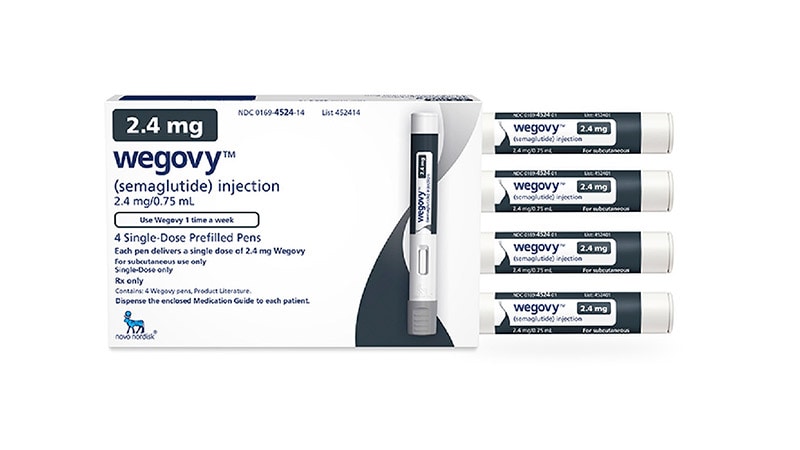Following reports that the European Medicines Agency (EMA) is looking into instances of suicide or self-harm after patients took the weight loss drugs semaglutide or liraglutide, the manufacturer, Novo Nordisk, issued a statement to Medscape in which it says it “remains confident in the benefit risk profile of the products and remains committed to ensuring patient safety.”
US experts say they haven’t personally seen this adverse effect in any patients except for one isolated case. An increase in suicidal ideation, particularly among younger people, has been reported following bariatric surgery for weight loss.
In the US, the two drugs ― both GLP-1 agonists ― already come with a warning about the potential for these adverse effects on the branded versions approved for weight loss, Wegovy and Saxenda. (Years earlier, both drugs, marketed as Ozempic and Victoza, were also approved for treatment of type 2 diabetes).
Of more than 1200 reports of adverse reactions with semaglutide, 60 cases of suicidal ideation and seven suicide attempts have been reported since 2018, according to the US Food and Drug Administration’s (FDA’s) Adverse Event Reporting System (FAERS) public database. For liraglutide, there were 71 cases of suicidal ideation, 28 suicide attempts, and 25 completed suicides out of more than 35,000 reports of adverse reactions.
The FAERS website cautions users that the data may be duplicated or incomplete, that rates of occurrence cannot be established using the data, that reports have not been verified, and that the existence of a report cannot establish causation.
The EMA is looking into about 150 reports of possible cases of self-injury and suicidal thoughts, according to a press release from the agency.
“It is not yet clear whether the reported cases are linked to the medicines themselves or to the patients’ underlying conditions or other factors,” it says. The medicines are widely used in the European Union, according to the release.
The review of Ozempic, Saxenda, and Wegovy, which started on July 3, 2023, has been extended to include other GLP-1 receptor agonists, which include dulaglutide, exenatide, and lixisenatide. This review is expected to conclude in November 2023.
In a statement sent to Medscape in response to questions about the European investigation, Novo Nordisk did not directly dispute a potential link between the drugs and suicidal ideation.
“In the US, FDA requires medications for chronic weight management that work on the central nervous system, including Wegovy and Saxenda, to carry a warning about suicidal behavior and ideation,” the statement indicates. “This event had been reported in clinical trials with other weight management products.”
It adds: “Novo Nordisk is continuously performing surveillance of the data from ongoing clinical trials and real-world use of its products and collaborates closely with the authorities to ensure patient safety and adequate information to healthcare professionals.”
Important to Know the Denominator
“What’s important to know is the denominator,” says Holly Lofton, MD, a clinical associate professor of surgery and medicine and the director of the Medical Weight Management Program at NYU Langone. “It needs a denominator with the total population on the medication so we can determine if that’s really a significant risk.”
Lofton described an isolated, anecdotal case of a patient who had no history of depression or mental health problems but developed suicidal thoughts after taking Saxenda for several months. In that case, the 25-year-old was experiencing problems in a personal relationship and with social media, according to Lofton.
Two other weight-loss specialists Medscape contacted had not had patients who had experienced suicidal ideation with the drugs. “These are not very common in practice,” Lofton told Medscape.
The US prescribing information for Saxenda, which contains liraglutide and has been approved as an adjunct to diet and exercise for chronic weight management, recommends monitoring for the emergence of depression and suicidal thoughts. In the clinical trials, 6 of the 3384 patients who took the drug reported suicidal ideation; none of the 1941 patients who received placebo did so, according to the FDA.
Similarly, the US prescribing information for Wegovy, which contains semaglutide, recommends monitoring for the emergence of suicidal thoughts or depression, but this recommendation was based on clinical trials of other weight management products. The prescribing information for Ozempic, the brand name for semaglutide for type 2 diabetes, does not include this recommendation.
Is it the Weight Loss, Rather Than the Meds? Seen With Bariatric Surgery Too
Speculating what the link, if any, might be, Lofton suggests dopamine release could be playing a role. Small trials in humans as well as animal studies hint at a blunting of dopamine responses to usual triggers ― including addictive substances and possibly food ― that may also affect mood.
Young people (aged 18–34) who undergo bariatric surgery are at an increased risk of suicide during follow-up compared to their peers who don’t have surgery, as previously reported by Medscape. And an earlier study found an increase in events involving self-harm after bariatric surgery, especially among patients who already had a mental health disorder.
For a patient who derives comfort from food, not being able to eat in response to a stressful event may lead that patient to act out in more serious ways, according to Lofton. “That’s why, again, surgical follow-up is so important and their presurgical psychiatric evaluation is so important,” concludes Lofton.
Lofton has been on the advisory board and the speaker’s bureau for Novo Nordisk and has received research funding from Novo Nordisk and Eli Lilly.
For more news, follow Medscape on Facebook, Twitter, Instagram, and YouTube.
Source: Read Full Article
